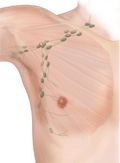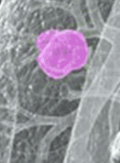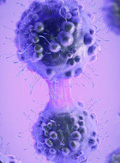The eLitMed.hu medical portal uses computer cookies for convenient operation. Detailed information can be found in the Cookie-policy.
Clinical Oncology - 2019;6(02)
Content
[Current views on the male breast cancer]
[Breast cancer in men is a rare disease, and accounts for only 1% of all diagnosed breast cancers. Hungarian incidence by available data much higher. The greatest risk factor of male breast cancer the elevated estrogen concentration in the body. Genetic disorders, as a Klinefelter syndrome and estrogen exposures and other metabolic changes might cause the male breast cancer. Symptom duration is longer than female population and the male breast cancers diagnosed in older ages and advanced stages. Frequency of BRCA2 mutation is probably 10% among male patients. The most common type is invasive ductal carcinoma with estrogen and progesterone receptor positivity. Diagnostic, surgical, radiation procedures and chemotherapy probably same as female breast cancer. The guidelines recommend as in adjuvant and curative setting the tamoxifen and other selective estrogen receptor modulators treatment. By large nation based registry the survival rate is different from male and female breast cancers. New biomarkers, genetic changes are under investigation to understand munch better the male breast cancer.]
[New perspectives in the treatment of lung cancer]
[In recent years, huge research is going on in the fi eld of oncology and as a result, we can see a signifi cantly longer survival in this area of medicine. Lung cancer, which has been taken places in the back for decades, it has not become a curable disease, but begins to belong to the chronic diseases. As a result of brilliant surgical technics and stereotactic radiotherapy, or as a result of changes in drug treatment, 5-year survival is not uncommon in metastatic lung cancer patients, next to relatively long progression free survive. After the third-generation cytotoxic combinations the added growth inhibition (VEGF inhibitor) maintenance therapy or continuous pemetrexed cytotoxic chemotherapy were resulted in high survival benefi ts. The fi rst real breakthrough, long progression-free survival was achieved by targeted treatment, which proved to be effective with known driver mutations. The other great result, especially in squamous cell carcinoma, was the immunotherapy, the inhibition of immune checkpoints, which effi cacy was confi rmed in adenocarcinoma also. Several studies are going on with adjuvant or neoadjuvant immunotherapy, and combined use of immunotherapy (either in combination with radiotherapy or cytotoxic chemotherapy).]
[Oncological treatment on certain special cases]
[Even in the absence of clinically signifi cant co-morbidities, cancer care is a major challenge for both patients and healthcare professionals. Routine anticancer treatment may be complicated by special clinical situations such as pregnancy or organ transplantation. The dosage of certain oncotherapy agents may be further affected by impaired renal and hepatic function or diabetes mellitus. These days, given the improved prognosis of cancerous diseases and increased survival, personalized therapy and prevention of long-term side effects is becoming particularly important, especially in the above-mentioned oncological situations. In this summary, we review the anticancer treatments recommended by ESMO in specifi c clinical situations.]
[CDK 4/6 Inhibitors in Breast Cancer: Current Controversies and Future Directions]
[Purpose of review: To describe the clinical role of CDK 4/6 inhibitors in hormone receptor-positive (HR+) metastatic breast cancer (HR+MBC) as well as current controversies and evolving areas of research. Recent fi ndings: Palbociclib, ribociclib, and abemaciclib are each approved in combination with an aromatase inhibitor or fulvestrant for HR+MBC. Abemaciclib is also approved as monotherapy for pre-treated patients. Key questions in the fi eld include whether all patients with HR+MBC should receive a CDK 4/6 inhibitor up front versus later line, impact on overall survival, role of continued CDK 4/6 blockade, mechanism of clinical resistance, and treatment sequencing. Summary: The development of CDK 4/6 inhibitors has changed the therapeutic management of HR+MBC. Additional research is needed to determine optimal treatment sequencing, understand mechanisms governing resistance, and develop novel therapeutic strategies to circumvent or overcome clinical resistance and further improve the outcomes of patients with MBC.]
[The role of stromal components in the behavior of malignant tumors]
[Stroma was considered for a long time as an innocent bystander without infl uence on the behavior of the cancer tissue. However, this opinion considerably changed in the last twenty years. Increasing evidences have been gathered proving that all components of the stroma is active participant in the development and progression of cancer. Although stroma can exert protective role against the early development of tumors, this changes soon as cancer cells are forcing the stromal components to support their growth. This can be accomplished by the induction of stromal stiffness, production of fuels, citokines, growth factors, new blood vessels for the progression of cancer cells. This recognition lead to the introduction of a new approach, targeting stroma in anticancer therapy. Among those attempt excellent results have been achieved by the immune and antiangiogenesis therapy, but countless other attempts are going on.]
[System approach in oncological care]
[As a successor of the traditional biomedical approach the biopsychosocial model provides an explanation for the origin of diseases which does not only focus on the biologic aspects, but suggests the infl uence of psychological and social factors as well. Paradigm shift resulted enhanced physician-patient cooperation while treatments have been expanded with the consideration of psychological and social factors which enabled the multidisciplinary team to more precisely estimate the patient’s condition and suitability for treatment, therefore, comprehensive direction of intervention can be conducted. Reactions, adaptation and coping with cancer can be described as an interaction of individual level, which involves the psychological features of the person in addition with social level that can be explained by family context.]
[Metals and cancer]
[We often tend to forget about our environment when looking for the origin of a disease. Inhaled air, drinking water and food, substances in contact with the skin all have an effect on the human body. Metals are indispensable parts of our everyday lives, their mining, processing and use cause a continuous exposure to them. Metal exert their effects on the body in various ways. Many of them are essential for maintaining homeostasis, but excessive or harmful metal intake can lead to health damage, including tumour formation through multiple attack points. Metals substitute each other during different transport processes and in the structure of proteins, they cause oxidative stress and bind to DNA, thereby damaging it. Applying them appropriately, the proapoptotic effect of the metal compounds is brought to the fore, thus becoming a therapeutic tool for tumours. Nowadays, platinum(II) compounds are widely used as chemotherapeutic agents and there are many ongoing studies to fi nd metal compounds with an ideal therapeutic and side-effect profi le. The aims of this article were to draw the attention to the dangers of metals in relation to cancer and to highlight their diverse application possibilities in current and future cancer therapy and diagnostics.]
1.
Clinical Neuroscience
[Headache registry in Szeged: Experiences regarding to migraine patients]2.
Clinical Neuroscience
[The new target population of stroke awareness campaign: Kindergarten students ]3.
Clinical Neuroscience
Is there any difference in mortality rates of atrial fibrillation detected before or after ischemic stroke?4.
Clinical Neuroscience
Factors influencing the level of stigma in Parkinson’s disease in western Turkey5.
Clinical Neuroscience
[The effects of demographic and clinical factors on the severity of poststroke aphasia]1.
2.
Clinical Oncology
[Pancreatic cancer: ESMO Clinical Practice Guideline for diagnosis, treatment and follow-up]3.
Clinical Oncology
[Pharmacovigilance landscape – Lessons from the past and opportunities for future]4.
5.









